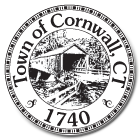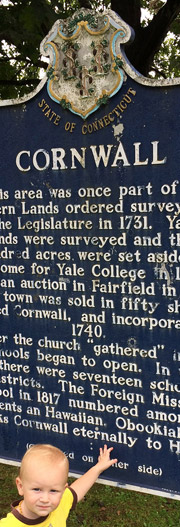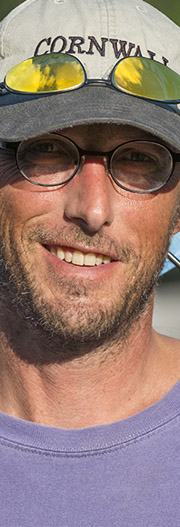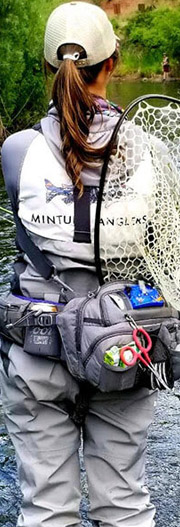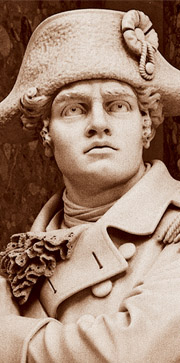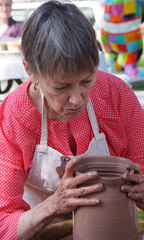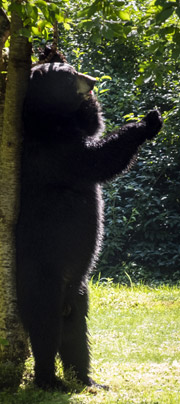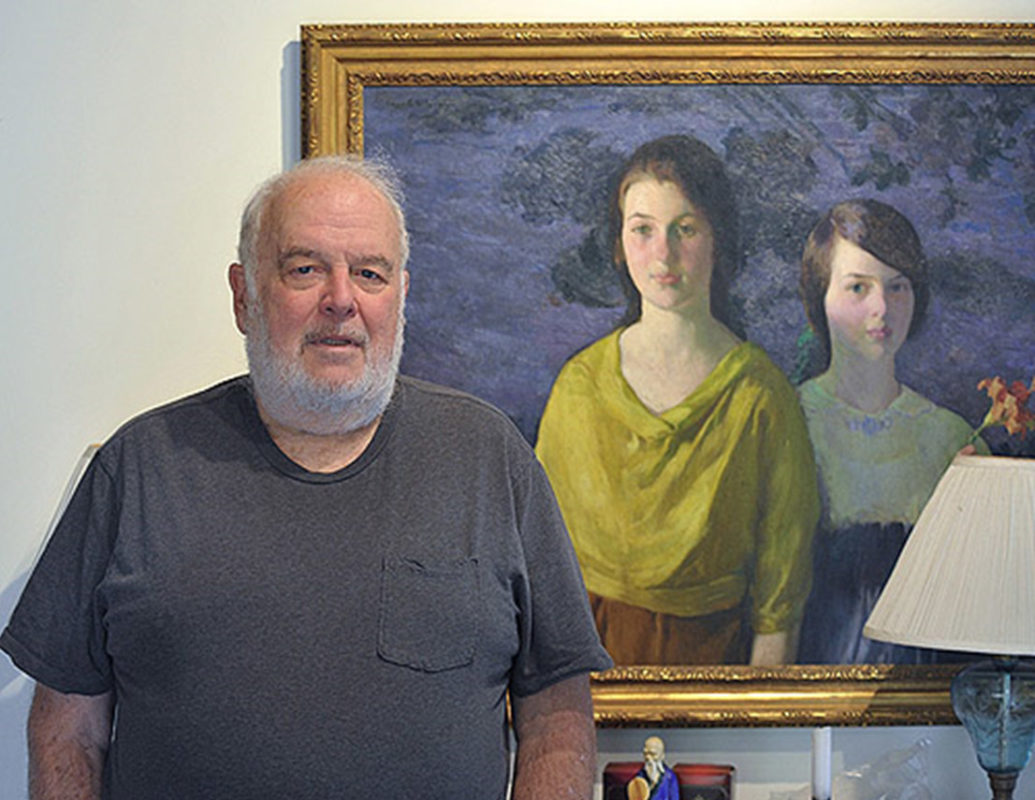In loving memory of John Miller 1931-2021.
From: The People of Cornwall, which chronicles the lives of people in Cornwall both present and past.
By Brenda Underwood
PDF VersionJohn Miller has tattoos—small ones on his upper arms, just below the shoulders. There is an “L” for “liberal”, his political persuasion, which also stands for his mother, Leonore, and granddaughter, Lila. There’s an “E” for “evolution”, his favorite theory, which also toasts his daughter, Emily. Then, there’s an “I” for his son, Ivan, a “C” for long-time love, Carol, and finally, an “SH” for “secular humanist.” These are people and ideas that are important to him.
John was born in New York City in early 1931 and grew up first in the Fieldston section of the West Bronx and then in Manhattan. His mother was the daughter of the painter Ivan Olinsky.* She studied at the National Academy of Design and the Art Students League where her father taught art. John’s father, Henry, was born in Demopolis, Alabama in 1892 but his widowed mother took him and his siblings to New York City where she had relatives in 1895.
Growing up, John attended a number of schools including the Riverdale School, where he started and finished, the Loomis School and the Collegiate School in Manhattan.
John’s father served in the American Expeditionary Force (AEF) in the First World War and eventually went into the diamond business. “As a young man he was a very good athlete and played shortstop on the City Athletic Club baseball team,” said John. “Later in middle age he went back to the violin that he had studied as a kid and became quite a good amateur musician. We had chamber music in our apartment on Tuesday nights for many years until his death in 1948.”
John was in his teens when his father died. “I mourned him for years. I’ve told my kids that when you have a parent or a grandparent and they are getting ready to die it’s very important to say goodbye to them. I don’t mean, ‘Goodbye Grandpa,’ I mean, spend some time with them and talk about your feelings. I never had a chance to say goodbye to my father.”
John’s brother, Dick, is two years younger than he. “We have much in common,” said John, “including our politics, love of music, classical jazz, Broadway, and sports.” John and Dick were both three-lettermen in high school and then, in college, Dick played baseball at Wesleyan and John played tennis at Ohio Wesleyan. “Dick is a retired English professor but is still an active jazz pianist in New York City and on Cape Cod.”
John’s mother lived for another 50 years after his father died “She was a magnificent parent – the most unselfish human being I have ever known. She supported us in everything we chose to do. She was always there for us.”
Leonore Miller died in 2001 at the age of 94. “Her three grandchildren were crazy about her. Every year on her birthday they get together and drink a toast to her. On her hundredth birthday, close family – and there aren’t that many of us – gathered at the cemetery for a few minutes and then went back to my brother’s apartment and ate coffee ice cream, her favorite flavor.”
After service in Korea, John began his career as a journalist at the Miami Herald. “From the time I was 12, I always wanted to be a newspaper reporter.” At the Miami Herald, John worked the night police beat his first eight months, something he regards as, “very much a learning experience.” His first front-page story was an interview with former President Harry Truman who was vacationing on the Florida Keys in 1956 when the Sinai War began. “After a press conference I had a one-on-one breakfast with Truman where I had coffee and a pecan bun and he had (drank) bourbon. Harry said people who drank scotch had no taste.”
John Miller with Harry Truman
Photograph of a photograph taken by Lazlo Gyosok

After Miami John worked for the Associated Press in New York and eventually for The World-Telegram and Sun, the long-defunct afternoon paper owned by Scripps Howard.
After two years with the AP, John, who had never been to Europe, began to develop itchy feet and left to travel around England, France, Greece, Italy and Germany for four months. In Vienna, he remembers going to six operas in five days (something which speaks well of those musical evenings as a child). After Vienna he hitchhiked to Salzburg and then into Germany and, “at that point I called my mother in New York and said if you ever want to see me again you had better send me enough money to buy an airplane ticket. And she did.”
From the Telegram John worked briefly for NBC News and then for two years as curator of publications for the New York Zoological Society. “My window overlooked the sea lion exhibit.”
John also knew as a child that he wanted to have a piece of land in the country. I loved going up to visit my grandparents in Lyme, Connecticut, so I started a savings account into which I put small Christmas and birthday checks with the idea that some day I would use that money to buy a few acres in the country.”
“I hadn’t accumulated a lot of money, but in 1961 when I was 30 years old I made an appointment with a real estate guy in Cornwall (Frank Cole, Maureen Prentice’s father) and eventually bought land on Warren Hill in Cornwall Bridge and built a small house on the edge of the woods overlooking Pritchard Brook,** an incredible stream which winds its way down the hill and almost surrounds my house.” John’s home was built by the late Ovel Degreenia and the Whitney brothers who worked for Ovel. “I am incredibly lucky because as a newspaperman I wasn’t making a lot of money, and ten years later I could never have afforded to come here.”
John returned to NBC in 1967 where he first worked on local news and then went on to write for the Nightly News when John Chancellor was the anchor. He eventually went to the Today Show where he stayed for 13 years.
In the summer of 1987, while John was in London “producing spots” at Wimbledon for the Today Show, John’s union went out on strike and he had to stop working. “When I came back 18 weeks later just about everyone who belonged to the union who was over 55 was offered a buyout. I took it”
Over the years, John had written documentaries for PBS on a freelance basis, “They weren’t high fallutin’ documentaries,” said John, “but mostly on movie subjects including Fred Astaire, Spencer Tracy, Katharine Hepburn, Jimmy Stewart, Humphrey Bogart and Judy Garland (many of which are now out on DVD). It was while NBC was out on strike and John was working on another documentary for PBS that he decided to take early retirement from NBC.
Many of those documentaries which “weren’t high fallutin’” received Emmy nominations, Emmy Awards and the Peabody Award. A sampling:
“Fred Astaire: Puttin’ On His Top Hat,” PBS, 1980 (Emmy nomination)
“Fred Astaire: Change Partners and Dance,” PBS, 1980, (Emmy Award)
“Starring Katharine Hepburn,” PBS, 1981, (Emmy nomination)
“Judy Garland: The Concert Years,” PBS, 1984 (Emmy nomination)
“The Spencer Tracy Legacy: A Tribute by Katharine Hepburn,” PBS, 1086 (Emmy Award Writer)
“American Masters,” PBS, 1986 season, program introductions for Joanne Woodward
“James Stewart: A Wonderful Life,” PBS, 1987, (Emmy nomination)
“Bacall on Bogart,” PBS, 1988 (Emmy nomination)
“Children’s Express Magazine,” PBS, 1989 (Peabody Award)
“Nature: The Gulf, Portrait of a War Zone,” PBS, 1991
“The Fred Astaire Songbook,” PBS, 1992
“The Universal Story,” 1995
History Channel introductions to documentaries, 1997
Introductions to 46 films by Columbia Pictures for Dick Cavett, 1998
John’s marriage lasted 14 years and, “produced two terrific children, Ivan, an emergency room doctor in New York City, and Emily, a multi-media artist and beekeeper living in Holyoke, Massachusetts.” He has one grandchild, Ivan’s daughter, Lila, who is a first-grader.
In 1988, John, along with his two cats, moved to Cornwall to live full time.
“I am even more liberal now at the age of 77 than I was when I was young,” says John, “and I was very liberal then. I’m glad I am and I’m glad my children are. It isn’t just politics. I also find as I’ve gotten older that I am more relaxed and more easy-going.”
Since 1979 John has had a relationship with Carol Schneider who joins him in Cornwall on weekends. “We’ve been together 30 years,” said John, adding that Carol has three boys who are all in their thirties and, “I love them as if they were my own children. I am very proud of them too.”
John’s house has an outdoor shower, not a common household fixture in Cornwall but something he loves. “I visited friends who had an outdoor shower on Martha’s Vineyard and I took a shower there on a slightly chilly August night under that warm water and I thought, “Oh God, how wonderful – it’s a great thing to do before you go to sleep. So I put in an outdoor shower.”
John has also showered his talents around Cornwall where he has been and is a very active member of the community. He is secretary of the Cornwall Volunteer Fire Department (CVFD), a position he has held for seven years. As Dave Cadwell, one of his fellow CVFD volunteers notes, “he does a job no one else wants to do, with style, hard work and intelligence, and always with that Miller humor.” He is also on the board of the Cornwall Association and writes and edits for the Cornwall Chronicle. Over the years he has also been involved with the Connecticut Humanities Council, Cornwall Democratic Town Committee, Cornwall Zoning Board of Appeals, Cornwall Board of Assessment Appeals and the Cornwall Free Library.
He is known as a practical joker and many people will recall John’s April Fools Day story from the April 2005 issue of the Chronicle regarding the Royal Visit*** of Prince Charles and Camilla, the Duchess of Cornwall, and the talk it generated among both skeptics and believers. John thinks that most people fell for it, “even though I put in things toward the end that were ridiculous, like the fact that they were going to go to the Moose to eat fish and chips.”
One who fell for it, a person who knows that the Buckingham Palace kitchen does not serve chips to members of the royal family as they are considered déclassé, and therefore would be a treat for the royal couple in the absence of the royal mum, argues that perhaps she could be forgiven for being duped?
Following this bravura performance, John and Lisa Lansing Simont who were editing the April issue of the Chronicle the following year decided, as an April Fool’s Joke, to report that the Covered Bridge in West Cornwall was being turned into a pedestrian bridge. Lisa wrote an article describing the Covered Bridge as being turned into, “a sort of a Pont de Vecchio with stalls on it including the hot dog man from Kent. “I don’t think that fooled a lot of people but,” he added, with that irrepressible laughter bubbling up, “I was told that one person said six months later, ‘Isn’t it a shame that they are closing the covered bridge.’” John has been editing the April issue of the Chronicle with Annie Koskiusko for the past five years, with the philosophy that life is not worth living without a sense of humor.
A keen singer, John has appeared locally in a number of theatrical and musical productions including “Carousel” at the Sharon Playhouse. “I got to sing some songs that I had first heard on Broadway in the original production in 1945. It was wonderful.
For many years, John also sang with Anne Chamberlain. “We did show tunes, mainly music from the 30s and 40s which were the two best decades for American songs because the best songwriters were alive and at their height then. Jerome Kern, Rogers & Hart, Cole Porter, the Gershwins and a dozen other great song writers. I can remember from the time I went to my very first musical – the original “Oklahoma” at the age of 12 in 1943—and I thought, ‘My God, I’ve got a lifetime of this ahead of me.’ I got shivers up and down my spine when the overture was played.”
“John Miller has a delightful voice,” said Anne Chamberlain, “and he is a walking encyclopedia of that time and an expert on Fred Astaire.”
He also likes to cook. “My cooking is kind of throw this in, throw that in; I haven’t the patience for cook books.” And he plays tennis, something he has been doing for over 70 years, “although, I’m considered an elder tennis player now.” John has several shopping bags of tennis trophies in his attic for the many tournaments he has won over the years. “All for doubles. John Horan used to call me a ‘doubles specialist.’” This past summer he won the men’s doubles tournament with Henry Blodgett at the Cream Hill Lake Association at the age of 77, a tournament John won 40 years earlier in 1969 with Charlie Van Doren.
And for the last 15 years he has been in a men’s group in Cornwall. “It was started by Spencer Klaw and John Zinsser because their wives were in women’s groups and they thought, ‘Hey if the ladies can do it why shouldn’t we?’ And they invited three of us to join them – Earl Brecher, Hunt Williams and myself. We talk about anything. If someone is emotionally in need we talk about that. We’ve added several people over the years – Sco Soule, George Kittle, Dave Cadwell and Marc Simont. It’s something I hate to miss. It’s just been another great part of Cornwall for me.”
“Friends of mine who don’t know Cornwall,” said John, “used to joke around that I considered Cornwall some sort of Shangri-la or Brigadoon, and in a way I do. Things aren’t perfect here but, for the most part, in the 47 years I have been up here it has been wonderful. I’ve met people here who are generous, kind and thoughtful, people who I really admire. I am so lucky that I came here.”
* Ivan G. Olinsky (1878-1962) is best known as a leading twentieth-century portrait painter, but he also executed a notable series of landscapes in Venice. In 1917 his work was exhibited with twenty-three prominent French and American artists, including Degas, Monet, Renoir and Sisley.
** Pritchard Brook
In 1961, John built a house beside Pritchard Brook. The following is an excerpt from an article he wrote for Readings to Celebrate Cornwall’s 250th Anniversary entitled “Pritchard Brook.”
“… I have now observed this stream for three decades of changing seasons. Heavy snows have sometimes hidden it. Heavy rains have sometimes given it big-boy proportions that have taken out foot bridges I’ve built. Sub-zero temperatures have glacierized it. Some summer droughts have stopped its flow. I have seen deer drink from it. Wild turkeys eat the seeds from tall grasses on the far shore. I have twice observed mink swimming in its cold waters in the early mornings of misty days and snakes and turtles too when the water became summer warm. … My favorite time of year at Pritchard Brook is autumn after the leaves have fallen but before the first snow. I call this the “brown” season. The land is brown … many different shades of that earthly color. There is the mud brown of the dead ferns that grown in great abundance on either side of the brook. There is the more delicate brown of the tall stalks of grass over near the pond. Grass so tall small deer and big turkeys frequently hide in it. The hill beyond the pond is a misty brown with lots of vertical lines made by the many skinny trees of this mostly third-growth forest. Here and there a few brown leaves cling to an oak sapling. The only other color comes from the green of a few white pines. Looking out the window of my dining room the brook suddenly appears in the lower right corner of my view, coming out of a clump of grass, and just as quickly disappears beneath the steep hill outside my window.”
*** Royal Visit
The Chronicle has learned that Cornwall will be visited later this month by the very-soon-to-be bride of England’s Prince Charles. In fact they are both coming for one day as part of their week-long visit/honeymoon to the U.S. Why Cornwall? Well, it seems that Camilla Parker Bowles will be given the title of Her Royal Highness the Duchess of Cornwall and thus Cornwall, CT, was added to their vacation itinerary as a sort of lark. While here, they will be guests of John and Julia Scott of The Mill House on Cream Hill Road. Mrs. Scott wasn’t certain of local activities for the couple, but she thought probably a visit to Cornwall Consolidated School and a private luncheon at The Wandering Moose, where the royal guests will dine on fish and chips, reportedly a palace favorite of His Majesty. She also thought the Prince might like to see Gordon and Jayne Ridgway’s organic farm during the planting season. Spinach and lettuce figure to be seeded this month. The Chronicle has also learned that several local citizens are being considered as honorary escorts for Prince Charles and his Duchess, among them Helen Tennant and Madelyn “Biffie” Estabrook, who have daughters living in England; George Kittle, rumor has it a descendant of Loyalists during the American Revolution; and Earl Brecher, whose name has a sort of semi-royal edge to it. Oh, yes, and Anne Baren, sometimes called “The Baren-ess by a Cornwall Bridge neighbor. All in all, it should be a super-fun, tingly 24 hours.
– John Miller, April 2005 issue of the Cornwall Chronicle
John with a painting of his mother Leonore and aunt Tosca painted by his grandfather, Ivan Olinsky
Photograph by Lazlo Gyosok

John at the age of 16
By Ivan Olinsky

October 2008
Grateful thanks to John for his help in writing and editing this profile. BU

